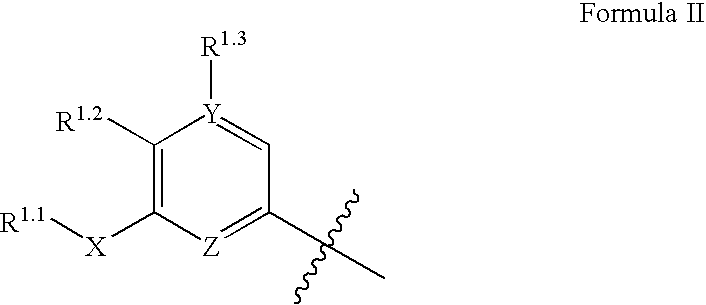Compounds, compositions, and methods
a technology of urea derivatives and compounds, applied in the field of substituted urea derivatives, can solve the problems of dilated and hypocontractile hearts, heart failure, and decrease in cardiac contraction and relaxation, and achieve the effect of improving the therapeutic index
- Summary
- Abstract
- Description
- Claims
- Application Information
AI Technical Summary
Benefits of technology
Problems solved by technology
Method used
Image
Examples
example 1
(R)-1-[3-(1-Acetyl-piperidin-3-yloxy)-5-fluoro-phenyl]-3-pyridin-3-yl-urea
1A. Preparation of SM 3
[0385]
[0386] (The amounts listed below are the total amounts used; therefore, ¼ of the total amount was added to each 50 L flask.)
[0387] Four 50 L 3-neck RBF extractors equipped with a mechanical stirrer under nitrogen, were charged with 10.76 kg (46.14 mol) (1S)-(+)-camphor-10-sulfonic acid (SM 2), 23.3 L (2.5 vol) ethanol (absolute), and 9.34 kg (92.27 mol) 3-hydroxypiperidine (SM 1). The solution was then brought to turbidity with the addition of 142 L MTBE. The solution was stirred overnight, and the solids were filtered and rinsed with 8 L (1:1) MTBE:EtOH, 8 L (2:1) MTBE:EtOH, and 8 L MTBE to afford 10.68 kg white solid (35% yield, 75.8% ee, these numbers are an average of the two lots). These solids were charged to a 22 L 3-neck RBF fitted with a mechanical stirrers thermometer, and reflux condenser. The flasks were charged with 10.7 L (1 vol) ethanol (absolute), and the solution...
example 2
3-{3-Fluoro-5-[3-(6-methyl-pyridin-3-yl)-ureido]-phenoxy}-pyrrolidine-1-sulfonic acid dimethylamide
2A. (R)-tert-butyl-3-(3-(3-fluoro-5-nitrophenoxy)-pyrrolidine-1-carboxylate
[0406]
[0407] A round bottom flask was charged with DMF (300 mL), and NaH (12.8 g, 0.320 mmol, 1.2 eq) and stirred in an ice bath. A solution of N-tert-butyl-(R)-3-hydroxypyrrolidine (50 g, 267 mmol, 1 eq) in DMF (100 mL) was added gradually into the flask and stirred for approximately 30 minutes. A solution of difluoronitrobenzene (51 g, 320 mmol, 1.2 eq) and DMF (50 mL) was added dropwise for approximately 30 minutes. The resulting solution was allowed to warm to room temperature and stirred for approximately 4 hours. Water was added to the reaction mixture. The reaction mixture was extracted with ethyl acetate. The organic layer was washed with water, saturated sodium bicarbonate and brine solutions. The organics were dried with sodium sulfate, filtered, and concentrated. The residue was purified by silica c...
example 3
(S)-1-{3-Fluoro-5-[1-(ethane-2-sulfonyl)-pyrrolidin-3-yloxy]-phenyl}-3-pyridin-3-yl-urea and
(S)-3-{3-Fluoro-5-[3-(6-methyl-pyridin-3-yl)-ureido]-phenoxy}piperidine-1-carboxylic acid methyl ester
3A. Preparation of 3
[0416]
[0417] Six 4 L Erlenmeyer flasks were charged with (1R)-(−)-camphor-10-sulfonic acid (215.2 g), absolute ethanol (480 mL), and 3-hydroxypiperidine (186.89). The solutions were then brought to turbidity with addition of tert-butyl methyl ether (MTBE, 4.84 L). The solution was stirred for 48 hours, and the solids were combined, filtered and rinsed with (1:1) MTBE:EtOH (960 mL), (2:1) MTBE:EtOH (960 mL), MTBE (960 mL) to afford white solid (1.27 kg, 35% yield, 90.8% ee). The obtained solids were charged to a 4 L Erlenmeyer flask with 1.27 L absolute ethanol. The mixture was stirred and warmed to 60° C. for 1 hour until the solids were completely dissolved. The heat was turned off, and the solution cooled to room temperature and stirred overnight. The solids were filte...
PUM
| Property | Measurement | Unit |
|---|---|---|
| temperature | aaaaa | aaaaa |
| temperature | aaaaa | aaaaa |
| diameters | aaaaa | aaaaa |
Abstract
Description
Claims
Application Information
 Login to View More
Login to View More - R&D
- Intellectual Property
- Life Sciences
- Materials
- Tech Scout
- Unparalleled Data Quality
- Higher Quality Content
- 60% Fewer Hallucinations
Browse by: Latest US Patents, China's latest patents, Technical Efficacy Thesaurus, Application Domain, Technology Topic, Popular Technical Reports.
© 2025 PatSnap. All rights reserved.Legal|Privacy policy|Modern Slavery Act Transparency Statement|Sitemap|About US| Contact US: help@patsnap.com



